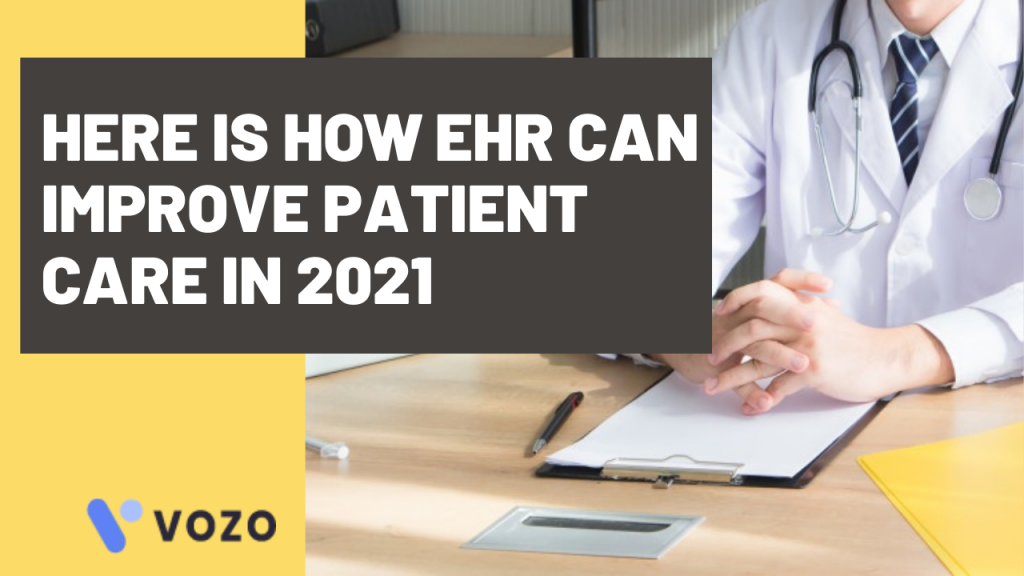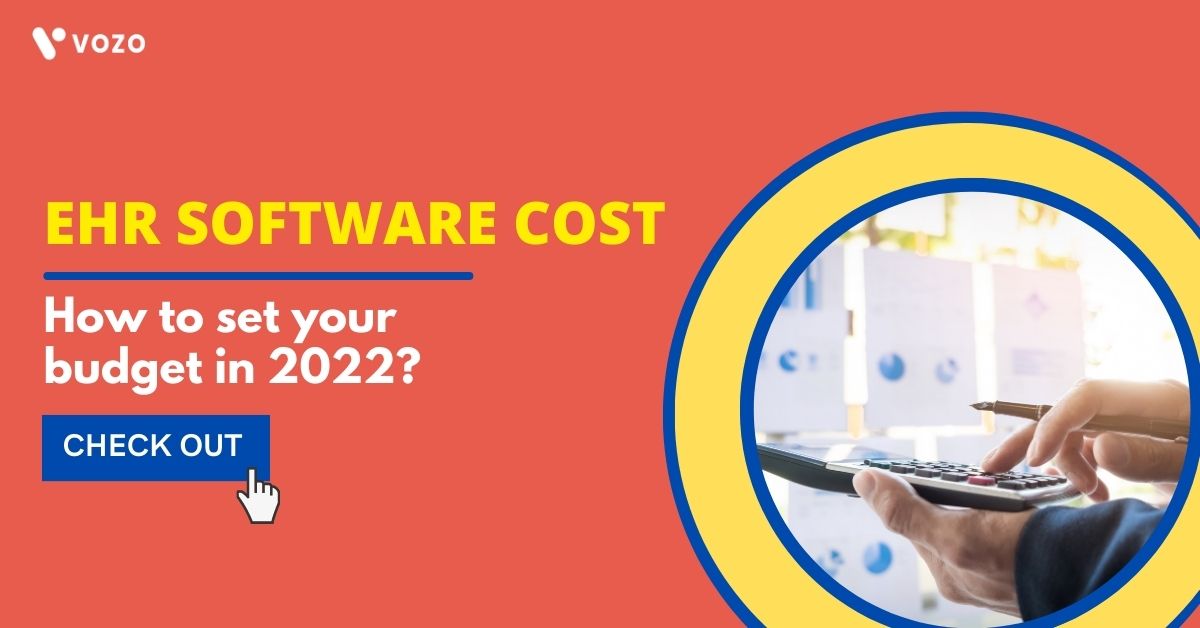EHR Software Cost: How To Set Your Budget In 2022?
While selecting the new EHR software, one of the first questions the healthcare organizations ask the vendor is ‘’how much does an EHR software cost?’’ Selecting and implementing the best EHR within the budget is one of the most important tasks for your healthcare practice.
Several studies estimate the cost of installing an electronic health record (EHR) ranges from $15,000 to $70,000 per provider. But the cost varies depending upon the type you choose to implement – whether on-site EHR deployment or web-based EHR deployment.
This guide helps you to understand everything about EHR software costs and how to set your budget.
Justifying The Cost Of Implementing EHR

One of the major obstacles healthcare organizations face during EHR selection is uncertainty over whether the investment is justifiable, particularly if a practice is operating on thin margins.
First, and obviously, an EHR investment must fit into a practice’s existing short-term budget; however, one should not simply assume that the capital investment made into an EHR simply represents a regulatory requirement practice must fulfill. Rather, EHRs can provide significant benefits in the form of cost reductions when properly leveraged to:
- Enhance service delivery
- Reduce costs
- Increase revenue
Accordingly, when making the case to justify the cost of an EHR investment the following strategies can be effective in creating buy-in from decision-makers in your practice:
A cost-benefit analysis focusing on specific elements of your practice such as quality of care, customer service, or efficiency.
An ROI forecast featuring short-term and long-term projections.
An analysis that features the total cost of ownership in the short-term and long-term so that decision-makers can be fully apprised of EHR-related costs
It is important to consider the key stakeholders in your EHR project including clinicians, administrative staff, board members, billing, and even your organization’s marketing department.
Your EHR stakeholders can make or break your EHR selection project, and having people in your organization who champion your software selection project can make a significant difference in the amount of funding your practice may receive.

Be Clear With The Features Before Implementing

Here is the set of questions you need to be very clear about before setting your budget for EHR implementation.
- Does the EMR come with an integrated Practice Management or Medical Billing Software? How much extra does it cost?
- Do you need to pay extra for Patient Portal?
- What about eRx? Is there a one-time cost and is there a monthly cost associated with the prescription feature?
- Does the EMR Vendor charge extra for establishing a lab interface with a standard lab like Quest or LabCorp?
- Will the EMR Vendor charge you additional dollars for creating new practice-specific templates?
- Does the EMR Vendor provide free Meaningful Use training or is there an additional cost involved?
- Will you have to pay for appointment text reminders and outbound fax services?
The Major Components Of EHR Implementation

Hardware:
Potential hardware costs may include database servers, desktop computers, tablets/laptops, printers, and scanners.
EHR Software:
Potential software costs include an EHR application, interface modules (e.g. lab interface module), and upgrades to your EHR application. Remember, software costs vary depending on whether you select an on-site EHR deployment or a SaaS EHR deployment.
Implementation Assistance:
Potential implementation assistance costs include IT contractor, attorney, electrician, and/or consultant support; chart conversion; hardware/network installation; and workflow redesign support. Your local Regional Extension Center (REC) can help. Contact your local REC to find out if you are eligible for free or reduced-price support.
Training:
Your organization will need to train your physicians, nurses, and office staff before and during EHR implementation. Physicians, nurses, and office staff need to understand how to use the EHR and associated hardware and how the EHR will create new workflows for your practice.
Ongoing Network Fees and Maintenance:
Potential ongoing costs include hardware and software license maintenance agreements, ongoing staff education, telecom fees, and IT support fees. In addition, your organization may need to hire new staff, such as IT operations staff, clinical data analysts, or application analysts.
RELATED: How EHRs Improve Patient Safety?: 6 Smart Ways
Consider The Benefits Of EHR Use

According to Health Affairs, practices can expect to cover the cost of EHR in approximately 2.5 years and then receive an average of approximately $23,000 per year per full-time employee in net benefits.
Considering these findings practices in various settings, sizes, and financial conditions can find some justification beyond simply complying with regulations.
Further evidence shows that when properly incorporated into a practice an EHR can provide an array of tangible benefits for the practice. The study outlined several areas in which an EHR can provide tangible benefits to practice including:
- Increased efficiency
- Increased quality of care
- Reduction of waste
- Fewer medical errors
- Better organizational outcomes (e.g., financial, and operational benefits)
- Better societal outcomes (e.g., improved ability to conduct research, improved population health, reduced costs)
When viewed in light of these findings, the decision to invest in the best EHR software can be justified on metrics beyond simple financial benefit.
Despite a variety of clear evidence supporting EHR’s benefits, sorting out whether an investment in EHR can be justified can be a difficult task to undertake. This is because budgeting for EHR-related capital expenses and modeling return on investment for EHR can be a difficult and imprecise process if not engaged carefully.
When deciding whether to invest in an EHR software a practice can rely on two tools:
ROI is a calculation of the most tangible financial gains or benefits that can be expected from a project versus the costs for implementing the EHR or suggested program or solution.
Compile Your EHR Costs

Asking how much an EHR cost is the sort of general question that often results in an answer that begins with the phrase planners and project managers dread: “it depends.”
The answer to how much an EHR cost depends on what practice is buying and for how long they intend to use it. Accordingly, it can be difficult to engage in an EHR price comparison without fully examining the variables that can affect the price of an EHR such as:
- The exact features a practice requires
- Add-ons such as practice management or patient portal
- Cloud or an on-premises deployment
- Updating hardware to support the system
- The scale of the installation
To create a comprehensive model of costs, the cost of an EHR should be expressed in terms of not just the “out of the box” price, but rather in terms of long-term and comprehensive cost estimates.
Recent EHR research found that the average budget per user for an EHR software is $6,000. Solo practices spent more on their software compared to larger practices.
Choosing your EHR deployment method (cloud vs on-premise) and factoring in associated costs
Furthermore, the cost of an EHR over the long term can also vary according to the method of software deployment.
RELATED: The Ultimate Guide To Healthcare Software Pricing Models
Get Started With The Best EHR Software

We hope this blog has shown how our electronic health records system can help your practice improve efficiency, compliance, and patient care. With customizable templates, intuitive workflows, seamless integrations, and robust analytics, our EHR enables your team to spend less time on paperwork and more time focusing on what matters – your patients.
Investing in an advanced EHR is a big decision that pays dividends for years to come in the form of time savings, improved documentation, reduced errors, and more.
Vozo EHR helps you to navigate all the potential challenges and provides exceptional service and technical support to make sure you have no burden in an afforable cost.
Ready to learn more? Try our free trial and know it for yourself. An EHR expert will give you a customized walkthrough based on your specialty, practice size, and specific needs.
About the author

With more than 4 years of experience in the dynamic healthcare technology landscape, Sid specializes in crafting compelling content on topics including EHR/EMR, patient portals, healthcare automation, remote patient monitoring, and health information exchange. His expertise lies in translating cutting-edge innovations and intricate topics into engaging narratives that resonate with diverse audiences.













